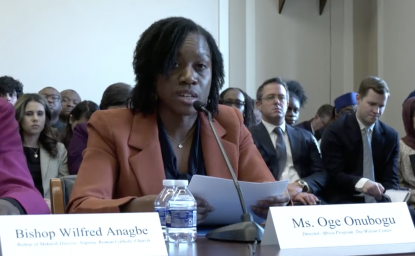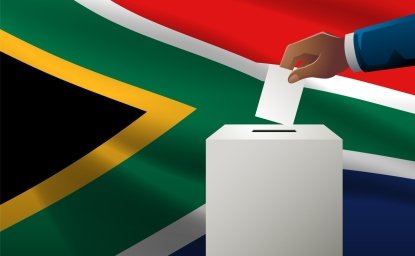Dave Peterson, National Endowment for Democracy (NED), Adrien Sindayigaya, Search for Common Ground, Burundi, Lena Slachmuijlder, Search for Common Ground, DRC, Narcisse Kalisa, Search for Common Ground, Rwanda, Howard Wolpe, Former Special Advisor on the Great Lakes Region to the Obama Administration, Moderator
After the 2005 election, most Burundians as well as external observers were optimistic about the country's trajectory. "It seemed like Burundi was on the right track for stability and democracy." All parties in Burundi worked hard to get a constitution, electoral law and code of conduct for parties and the 2010 election cycle was expected to be the turning point from war to peace and democracy. However, as a result of the ruling party's success in the 2010 communal election, the political climate deteriorated. The main opposition parties cried foul and boycotted the subsequent legislative and presidential elections. Instead of reaching out to the opposition, the ruling party intensified the persecution of the political opposition and moved against the independent media and civil society. With the human rights situation worsening, Burundi's democratic progress seems lost.
Free and Fair Elections?
Among a majority of Burundians, President Pierre Nkurunziza and his party are immensely popular. While there has been intimidation from different parties as well as some irregularities, in general the elections are considered to have respected international standards. Panelists agreed that the election results reflect more or less accurately the popular opinion in Burundi. "The president went to the villages to build schools and plant avocados, so people really started to recognize and like him. He is seen as the person who responds to the people's needs." Most opposition parties were ill informed about the popular perceptions, as they had no or only a very marginal presence in the rural areas. "Politicians were surprised, because they never went to the country to see what people really need." Some opposition leaders have supported their allegation of fraud by arguing that they had held rallies with 5,000 people in certain villages, but then only got a few hundred votes. However, this reading does not correspond to reality. "Burundians listened to several politicians and then decided for whom they would cast their vote."
Observers were surprised when the opposition parties denied the result of the communal elections. Panelists considered the boycott a mistake, as the parties could still have won a significant representation in the legislative branch. An opposition party that participated in the legislative elections won 16 seats in national assembly. However, "the lack of democratic culture did not allow the majority of opposition parties to acknowledge their defeat and support the president during his mandate."
Will Burundi return to civil war?
Since the results of communal elections were announced, the level of insecurity in Burundi has increased. A first attack targeted civilians working in sugar plantations. During another ambush armed men killed cattle that were thought to belong to a member of the ruling party. There have also been several attacks on buses, but no one has claimed responsibilities for these acts. The amount of unverified rumors makes it difficult to distinguish facts from imagination. Ordinary Burundians do not know if the country is facing a new rebellion or only armed bandits. What they do perceive are increased signs of insecurity. Several opposition leaders have left the country during the election process. Some of them are assumed to have left the country in preparation for a return to arms with the intention of building up pressure against the government. However, the government blames "armed bandits" for the recent attacks, and has resisted pressure to recognize the armed group as rebels and engage in negotiations. Government security forces have increased political prosecution post-elections, including mass arrests. However, across the country, so far the killings are targeted rather than directed against entire communities.
The panelists acknowledged concern about looting and attacks, but they argued that a return to large-scale fighting was unlikely. "There is no open war in Burundi, but there are sporadic clashes." Several positive forces decrease the likelihood of resumed armed conflict. First, the cohesion within the national army is a robust constraint for the build-up of any significant armed opposition. "The Burundian army's remarkable command structure makes it one of the most cohesive units in Africa." Second, Burundians are tired of fighting. "No one wants to return to war." People value democracy and ask government to dialogue with opposition. Third, neighboring countries have little interest in destabilizing Burundi and hosting rebels. Fourth, civil society organizations are considerably united. They have the potential to bring about positive change. On the negative side, conflict over land has increased – particularly within families. As families grow and the land is limited, brothers often fight over their inheritance.
How to approach the current difficulties?
As the ruling CNDD-FDD has a strong grip on the power, it lacks the incentive to engage in dialogue. "The government does not like the word ‘negotiation,' but they need to create at least some official session between the government and the opposition." Recent events have led to a loss of trust among the stakeholders. "We cannot wait until things become worse." Panelists advocated for a resurrection of a long-term confidence-building process. All political actors need to recognize their interdependence and avoid winner-takes-it-all perspectives. "We need to build a process that allows them to develop some skills to develop their self interest differently. They need to understand first that it is in their own self-interest to collaborate with the other side." The army is a good example of positive efforts in this regard.
With the absence of any other significant political party, civil society has become the default opposition and, therefore, the target of government repression. The opposition and civil society need more space and freedom for expression. Opposition parties are weak and require support to become more constructive actors. During the electoral process, many donors and organizations have recognized the need to step up the efforts to strengthen political parties.
Despite the fact that about 25% of Burundi's government budget comes from foreign aid, the international community has relatively little influence on the government and events. Nevertheless, the international community can continue to play a positive role if it acts in a united and consistent manner. The World Bank is one of the most respected and influential actors in Burundi and is particularly well situated to provide pressure. It is most important to encourage efforts for reconciliation and provide support for civil society and media. Moreover, the international community needs to identify the countries and groups that support the armed groups.
Ethnic issues
Although ethnic and identity issues are still present in the Great Lakes region, the extent to which the Tutsi-Hutu dynamic has diminished in Burundi is remarkable. The constitution has been conceived to give place to both groups, and it is respected – even in the army and in the police. Violence is not targeting one group. The contest for political power is mainly among Hutus. Political parties try to recruit the Tutsi to support them. Nevertheless, Tutsi still largely make up the urban elite and the rural poor are overwhelmingly Hutu. Civil society organizations tend to be led by more educated Tutsi elite in the urban areas. "Burundians say the [Tutsi-Hutu Ethnic divide] does not existent. Certainly, it is not as present as it used to be, but it might still come back." There are some unconfirmed rumors about the possibility of establishing a pro-Hutu alliance between Burundian elements and the FDLR.
Regional dimensions
Developments in Rwanda and Burundi are linked; an event in one country necessarily has an impact in the other country. Many people have family ties across the border and both countries have a long history of crossborder refugee flows. Fortunately there are currently no tensions on the border, but things can change rapidly. The lack of security-sector reform in the Democratic Republic of Congo (DRC) makes the Eastern region a fertile environment for any kind of armed group. A recent ban by President Kabila an all artisanal mining activities has proven favorable for other armed groups to buy access to the mines. The ban on export increases opportunities for corruption and fraud. Burundi continues to export minerals from the Congo because of fiscal inconsistencies that make exportation cheaper from Burundi than from Congo and because of corruption within the Congo. The process of refugee returns to and from Burundi present a huge risk without the necessary security conditions in place. Last but not least, a possible resumption of large-scale hostilities in Burundi would have an impact on the current attempts for integration in the Great Lakes region. In recent years, there has been huge progress in terms of collaboration between Burundi, Rwanda and the Congo. The three countries have held many tripartite meetings about the peace process in the Congo and the security forces have been cooperating to address transborder issues.
Conclusion
Despite a discouraging scenario of increasing violence and declining political freedoms, civil war is not imminent in Burundi. Many factors mitigate against the resumption of large-scale hostilities. First and foremost, there is a sense that a vast majority of Burundians do not want a war and have an understanding of the mechanisms politicians have used to manipulate them towards conflict. All actors deserve some blame for the current situation. The president is still very popular and could have governed the country and won the election without using force to consolidate his power. Despite speculations about a possible split within the ruling party, the president seems to be fully in charge. The political opposition could not reconcile the idea that they would lose the elections and, therefore, some have opted to use violence to contest for political power. Unfortunately, force is still seen as the regular pattern. A lot of things are frightening, but there is room for optimism. The current conflicts are no longer between Hutu and Tutsi. International support for civil society level and regional collaboration have the potential to contribute to long-term stability and sustainable peace.
For more information about this and other GLPF forums, please click here.




